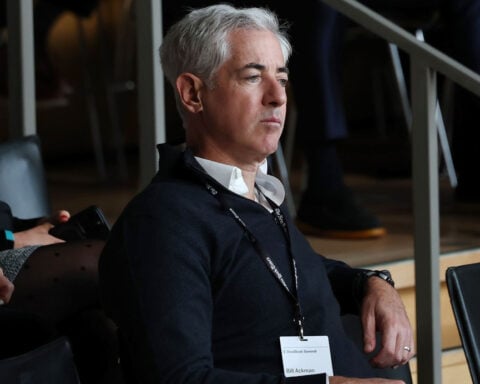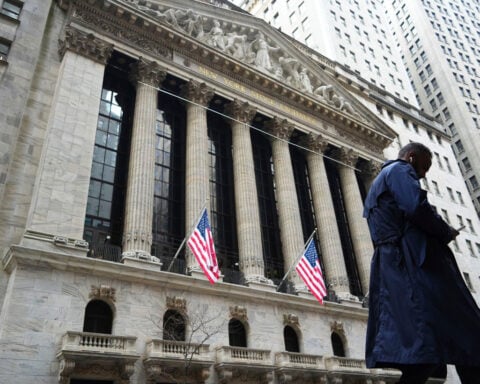By Suzanne McGee
(Reuters) - Large, established asset managers that have been slow to cash in on investor demand for exchange-traded funds are now trying to grab a slice of the market with a flurry of new ETFs and also by converting existing mutual funds into ETFs.
Goldman Sachs and Calamos Investment Management recently established actively managed ETFs. Morgan Stanley announced plans to convert two of its actively managed mutual funds into ETFs.
The moves demonstrate the eagerness with which asset management firms that are relatively new entrants are embracing ETFs, which are cheaper and more liquid for investors than traditional mutual funds.
Around 75% of the 376 new ETFs launched this year through Oct. 6 were active, according to Morningstar Direct. That means that rather than tracking an index, a manager or team is selecting assets aimed at reflecting an investment strategy or outperforming a specific benchmark.
That compares with 63% last year and 36% in 2019 when U.S. securities regulators opened the doors to the product.
Lower fees, strong liquidity and transparency have steadily lured investors away from traditional mutual funds and into ETFs over the past five years. U.S. ETF assets have doubled to reach $7.4 trillion. That accounts for nearly 30% of assets managed by all U.S. firms in mutual funds or ETFs, according to Morningstar.
Mutual fund assets, meanwhile, fell 14% to $15.3 trillion.
Traditional asset managers that built their reputations offering mutual funds are now trying to respond.
"Some industry participants are playing catch-up," said Brendan McCarthy, head of ETF distribution at Goldman Sachs Asset Management which launched a small cap active ETF last week. It manages six other active ETFs, and 36 ETFs in total.
While active ETFs only account for 6% of the market, their assets have grown at a rate of 23% so far this year, said Bryan Armour, an Morningstar analyst. That compares to asset growth of only 4.5% for the traditional passive index ETFs in the same period.
Many established asset management firms eager to capture a share of the rapidly-growing ETF market have identified their stockpicking skills as a competitive advantage.
"This is very much the direction of travel for us," said McCarthy.
Calamos Investment Management is another established manager trying to leverage its brand name and expertise investing in what are known as "convertible bonds", securities that pay out yields like bonds but that can be swapped for the underlying stocks. It rolled out an active ETF to draw on that expertise last week.
“We think this is something distinctive, that draws on our analytical knowledge of the market,” said Matthew Kaufman, who joined Calamos in January to head its fledgling ETF business.
Converting an existing mutual fund is another way traditional managers can catch up while also retaining star managers, said Aniket Ullal, head of ETF data and analytics at CFRA, an investment research firm.
"Conversions give a firm the opportunity to leapfrog up the leaderboard," Ullal added.
Assets held in converted ETFs now tally some $78 billion, compared with $40 billion at the end of 2022, Ullal said.
Morgan Stanley is among the latest managers to join the conversion rush. It plans to transform its Core Plus Fixed Income Portfolio fund and the Short Duration Municipal Income Portfolio fund, which have nearly $750 million in assets, into ETFs. Morgan Stanley didn't return calls seeking comment.
(Reporting by Suzanne McGee; editing by Michelle Price, Ira Iosebashvili and David Gregorio)

 Trump has begun another trade war. Here's a timeline of how we got here
Trump has begun another trade war. Here's a timeline of how we got here
 Canada's leader laments lost friendship with US in town that sheltered stranded Americans after 9/11
Canada's leader laments lost friendship with US in town that sheltered stranded Americans after 9/11
 Chinese EV giant BYD's fourth-quarter profit leaps 73%
Chinese EV giant BYD's fourth-quarter profit leaps 73%
 You're an American in another land? Prepare to talk about the why and how of Trump 2.0
You're an American in another land? Prepare to talk about the why and how of Trump 2.0
 Chalk talk: Star power, top teams and No. 5 seeds headline the women's March Madness Sweet 16
Chalk talk: Star power, top teams and No. 5 seeds headline the women's March Madness Sweet 16
 Purdue returns to Sweet 16 with 76-62 win over McNeese in March Madness
Purdue returns to Sweet 16 with 76-62 win over McNeese in March Madness








